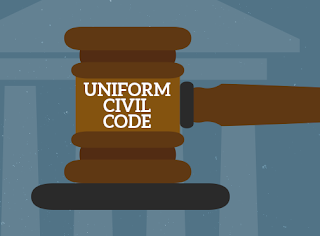India is filled with diversity and when constitution was drafted,
there were personal laws of religious communities. The Uniform Civil Code of
India proposes to replace those personal laws based on scriptures and customs
of each major religious community and set standard rules related to marriage, divorce etc.
Recommended Read : A Novel
Recommended Read : A Novel
Constitutional Position and the Controversy
Directive Principles of States are the set of rules which states
should follow while formulating policies. In Article 44 of Directive Principles
of State Policy, Constitution guarantees Uniform Civil Code to all citizens.
The controversy arises due to its conflict with Fundamental Rights
of the Indian Constitution, where under article 25; the right to practice
religion is given.
Main conflict arises due to Muslim Personal Law, which is inspired
by Sharia Law and remains unreformed since 1937, permitting unilateral divorce,
polygamy in the country and keeping India among the category of nations legally
applying its sharia.
Origin of personal laws goes back to the British India, when
British feared opposition from Hindu and Muslim and did not interfere in their
religions.
Women’s Right and Personal Law- Some women activists demanded for
Uniform Civil Code in 20th Century with the objective of Women’s
right, equality and secularism. Prime Minister Jawahar Lal Nehru also demanded
for Uniform Civil Code but it was compromised.
Law Commission report on “Reform in Family Laws”
Law commission reported that Uniform Civil Code is neither
necessary nor desirable at this stage. In fact it was advised to the government
that first to remove gender gap between man and woman rather than removing gaps
of religious communities.
Law commission also wrote that “Most countries recognized the
difference, and differences don’t imply discrimination but indicate a robust
democracy” , yet the women should be given the right to equality.
Preserving diversity was emphasized as well as it was suggested to
ensure that individual rights are preserved.
What is suggested?
The way forward was not
to follow the uniform civil code but the codification of all personal laws so
that prejudices and stereotypes in every one of religion would come to light.
Certain universal principles can be prioritized by the government rather than
imposing of a uniform code.
Certain aspects of
marriage and divorce and should be uniformly accepted in the personal laws of
all religions.
Suggested amendments-
1.
Fixing marriage age of boys and girls at 18 yeas so that they
marry equals.
2.
Making adultery a ground of divorce for men and women both
3.
Nikahanamma should make it clear that polygamy is a criminal
offence.
Conclusion
Though Law
commission report fears about the consequences of imposing uniform civil code,
as diversity will come at conflict. Reforms are needed, but like always
religion has to be kept away. AT present, government can hold the decision to
apply uniform civil code and emphasize on reducing gender gap, and giving
standard guidelines to all personal law boards so that basic rights are
accessible to women and men equally.











